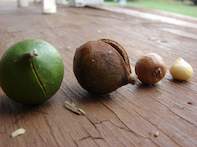
Macadamias South Africa (SAMAC) delivers industry leadership through sustainable and broad-based research and market development, focussing on all commercial and transformation fundamentals of the industry.
Macadamias South Africa (SAMAC) fills the gaps of what individual macadamia growers cannot do for themselves. Its primary services can be divided into three main categories, relating to communication, marketing and pests, disease and research management.
In terms of communication, SAMAC serves as the mouthpiece of South African macadamia growers by representing them at international events and in various national stakeholder forums. SAMAC also interacts and networks with local and international governments and role-players on market and production related aspects.
Macadamias South Africa (SAMAC) gathers, interprets and releases industry information statistics, including global information and forecasts.
Strategic developments, news and other information are communicated to members through various platforms, such as the SAMAC App, Facebook, monthly newsletters, WhatsApp, the annual SAMAC Journal as well as regional farmers’ days.
When it comes to marketing, SAMAC aims to increase the per capita consumption of South African macadamias across the world. To this end, SAMAC participates in consumer awareness campaigns of the World Macadamia Organisation and conducts generic consumer awareness campaigns in targeted markets to raise awareness of the excellent quality and taste of South African macadamias.
As far as pest, disease and research management are concerned, SAMAC informs growers of pest and disease threats and also manages the way in which research funding is spent to ensure research is aligned with the needs of growers.
Research is generally directed towards the development of sustainable and environmentally responsible production practices, such as improved and more efficient pest and disease management practices and protocols, improved production practices and research into the health benefits of macadamias to help grow consumer demand. Twenty-seven industry-related research projects were conducted in 2019. Members also have access to a free pest and disease clinic.
 Macadamia nuts were already established in the Durban Botanical Gardens in South Africa in 1915, the source of which is still unknown. Comme...
Macadamia nuts were already established in the Durban Botanical Gardens in South Africa in 1915, the source of which is still unknown. Comme...